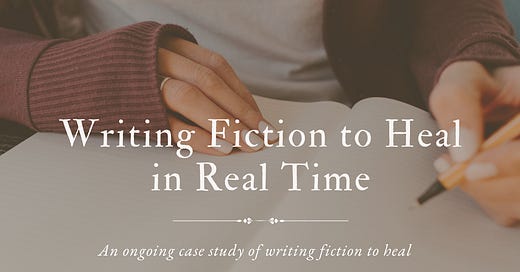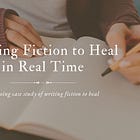The Emotional and Vulnerability Hangover
Navigating the side effects of Writing Fiction to Heal
If you’re new to The Rebel MFA Way, welcome! This is an essay in my ongoing “Writing Fiction to Heal in Real Time” series where I deep-dive into my writing fiction to heal method as field work and a case study. To begin, I will be working through my story, The Archive, which you can find more information on here.
[NOTE: Your email provider may truncate this essay, be sure to click on “keep reading” to read the entire piece.]
I knew writing the last few entries of The Archive would hurt.
There was no way around it.
I’d been keeping Ari “safe enough” for too long—letting her scrape by without forcing her to truly confront the hardest things. And if I’m being honest, it wasn’t just for her sake.
It was for mine.
Because I knew that once I wrote those entries, I couldn’t unwrite them.
That’s the thing about writing fiction to heal: the healing doesn’t usually happen in the moment of writing. The writing is just the scalpel. The wound has to be opened before it can close.
When I finally pushed Ari into true survival mode, I realized I was pushing myself there, too.
I’ve written hard scenes before. But Entries 5-7 felt different.
It wasn’t just about Ari losing her home or being physically injured. It was about what those things meant.
This entry forced Ari (and me) to confront things I’d been avoiding:
What happens when you have to navigate the end of the world without the medication you rely on?
What would we do in a true life/death situation and how in the hell would we actually survive it?
What do you do when survival means doing the one thing you swore you’d never do?
What would push you so far that you no longer recognize yourself?
The first thing I noticed after writing these entries?
I was exhausted.
Not just from the writing itself, but from the weight of the decisions I had to make for Ari.
Every choice felt massive. Every detail felt loaded. What happens next? Where does she go? How does she deal with the pain, the loss, the fear?
I spent all my emotional bandwidth writing about her survival—only to come back to our own collapsing world.
That was the part I wasn’t prepared for.
Because in the past, writing fiction to heal has always been a form of emotional alchemy—taking something painful and turning it into story, giving it distance. But this time, there was no distance.
The things I was writing felt too real.
I used to laugh at doomsday preppers. The people hoarding supplies, drawing up escape routes, preparing for a future where everything falls apart.
I don’t laugh anymore.
Writing The Archive has made me realize there’s nothing ridiculous about being prepared. It’s not paranoia—it’s survival.
So now, I’m asking myself the same questions I’m asking Ari.
If everything collapsed tomorrow, would I be ready?
Do I have the skills to survive?
Do I even want to?
That’s what hit me the hardest.
Because it’s one thing to write about a character questioning her survival. It’s another to write those words and feel them echo inside you.
When I finally finished these entries, I sat there, staring at the screen.
I should’ve felt relief. Or accomplishment. Or something that marked the end of a difficult writing session.
Instead, I felt raw. Drained.
Like I’d just survived something instead of written it.
And I guess, in a way, I did.
Because writing fiction to heal doesn’t mean writing doesn’t hurt.
It means you walk into the pain willingly, knowing that the only way out is through.
And the aftershocks? They don’t just disappear once you close the document.
I’ve never been afraid of writing hard things. But I’d be lying if I said there weren’t moments in The Archive that made me pause.
Moments where I asked myself: Do I really want to go there?
Because writing fiction to heal is a balancing act.
You have to dig deep enough for it to matter… but not so deep that it swallows you.
You have to know when to push through… and when to step back.
And the truth is, I don’t always get that balance right.
There are times when I have to stop mid-scene because it’s too much, too soon. Times when I have to remind myself that healing doesn’t mean self-destruction.
Because writing can be cathartic, but it can also be a self-inflicted wound if you’re not careful.
And that’s the part of writing that people don’t talk about enough.
They talk about how writing helps you process things. How it can be therapeutic.
But they don’t talk about the cost.
Because sometimes, writing fiction to heal means you walk away from the page feeling worse before you feel better. And that’s okay. That’s part of the “work.”
After this last batch of hard writing, I took a much-needed emotional break.
I didn’t try to write. I didn’t try to figure out what happens next or where Ari is going.
I sat with the discomfort of what we had just gone through.
Because sometimes, the best thing you can do for yourself after writing something painful is nothing at all.
But I also leaned on the tools I know help me recover:
Grounding activities—getting outside, moving my body, touching something real.
Letting my brain rest—reading something light, watching something comforting, getting out of the collapse for a while.
Giving myself permission to pause—knowing that just because I could keep pushing doesn’t mean I should.
Because if I don’t take care of myself after writing the heavy stuff, I won’t have the energy to keep going.
So why do it?
Why write stories that pull you under, that leave you drained and aching?
Why put myself through it—why put Ari through it—if it’s this hard?
Because this is where the healing happens.
Not always in the moment of writing. Not always in the immediate aftermath.
But in the long, slow process of making sense of the hurt.
Because these stories matter. Because they make us ask hard questions. Because they make us feel.
Because healing isn’t about avoiding the pain. It’s about learning how to live with it.
That’s why I keep writing.
Next time…
I’ll be giving you a publishing schedule update and some other mid-experiment observations and announcements as we hit the 12 week mark soon (can you believe it?!)
Don’t want to get these email notifications? Or maybe you want to make sure you get these notifications? Manage your notification settings here:
To read the backstory to why I’m writing this series:
To read the backstory on why I’m serializing “The Archive,”:









Whoa. Thank you so much for sharing that. It helped me stop beating myself up for needing a break from writing my fiction. Mine was also getting too real, too hard just too much. Thank you for reminding me that it's ok to take a break but you have to go back. Because we write to heal, even when it's hard. And we also stop when it's too hard. But then we go back. Again and again. You showed me that I'm not doing anything wrong by feeling too much, not doing enough, or any of those reflexive self-blaming lies. I'm doing the work. I see you doing the work and it's hard for you too. But you even said the same line I say to myself when I pull up my big-girl pants and get back to writing. "The only way out is through." I don't have to love writing all the time or even the having written bits. I just have to do the work. Then rest. Then write. Over and over. Just like Jade is doing.